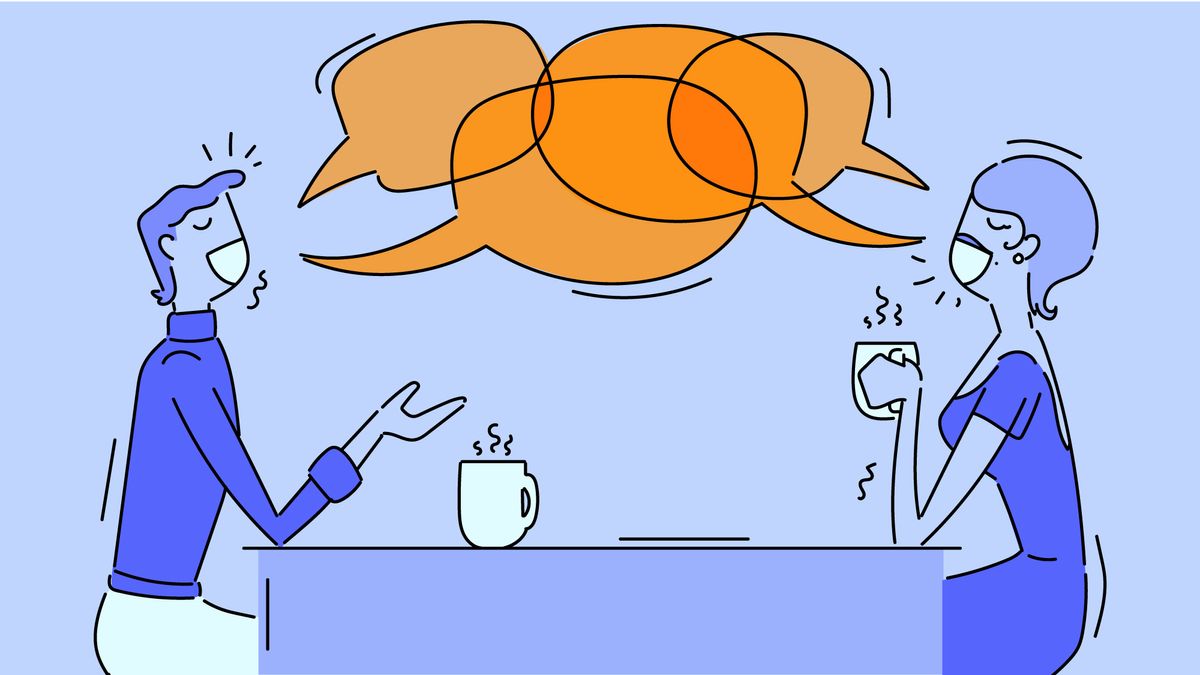Interrupters And Non-Interrupters

Recently I was reminded of one of my favourite examples of competing social norms: conversational interrupters and non-interrupters.
- Interrupters have a norm where you keep talking until someone interrupts you, it's not rude to interrupt someone, and you shouldn't mind if someone interrupts you. (Apparently linguists call this "high-involvement cooperative overlapping").
- Non-interrupters have a norm where you don't start speaking until someone else has stopped, or invited you in.
Either norm works fine around other people with the same norm, but not around people with the competing norm.
I think it can be hard to accept that both norms are genuinely fine, because it's easy in conversations to feel annoyed at people who are violating your norm only because they don’t share it. Ok, more accurately: as a non-interrupter I get annoyed at interrupters, but I don’t know if interrupters get annoyed at non-interrupters per se, or just find us rather dull -- this dynamic isn’t fully symmetric.
Still, I think it's hard to claim there's an objectively correct norm here, even though there's one norm that I strongly prefer myself; it's just unfortunate that people often have conflicting norms without realising it.
Of course, there are people who e.g. are happy to interrupt you, but get mad if you interrupt them -- those people aren't adhering to the interrupter norm, they're just hypocrites/assholes and it's not fair to conflate them with adherents of the interrupter norm. Similarly, someone who is checked out of the conversation and not really listening or engaging is not adhering to the non-interrupter norm, they're just not involved in the conversation.
One thing to note is that the interrupter norm seems "evolutionarily" dominant –– in a group with interrupters and non-interrupters, the interrupters will inevitably fill up all the conversation time and the non-interrupters will never get a space to speak. Again, this is a descriptive claim, not a moral one: you might think it’s good or bad or neutral, but in practice in a mixed group it’s the interrupter norm that is going to win out. (There’s two ways that can happen: either the interrupters do all the talking, so the interrupting norm wins, or the non-interrupters also adopt the interrupter norm, so the interrupting norm wins).
If you're a non-interrupter and you find yourself in a group with interrupters, there's a solution that's simultaneously easy and difficult, which is to force yourself to interrupt. It's easy in the sense that it's something you can do by yourself, without coordinating with the whole group; it's hard in the sense that (if you're a genuine non-interrupter) it feels socially and morally repulsive.
I don't know what to say about this except that, once you're aware of the interrupter vs non-interrupter norm distinction, you can try to focus really hard on the fact that the other person won't see it as rude if you interrupt them (and will in fact think it's a good thing). I have tried to do this at times, but it’s hard to get the rhythm right -- I keep trying to find a good moment to jump in but don’t understand the rules of the game (it can’t possibly be true that you can interrupt people anytime). It feels like being a social dancer who can’t quite hit the beat, and creates the same temptation to just slink away and sit things out.
If you're the sole interrupter in a group of non-interrupters then you can similarly adapt to the other people's norm, with similar ease-and-difficulty: “all” you have to do is not-interrupt people. But I’ve seen interrupters try to do this and it’s clearly very hard for them: they have a deeply ingrained habit of joining in other people’s speech, and suddenly trying not to do that seems like trying to speak without saying “um” -- you can do it, but it requires a huge amount of attention, and makes it hard to get into the flow of things.
If there's more than one interrupter in a group, I still haven't figured out what a single interrupter can do to accommodate the non-interrupters -- this is exactly because the interrupter norm is evolutionarily dominant, so if there's even one active interrupter in a group then that norm will win out, even if there are a larger number of non-interrupters around. A single interrupter could try to deliberately include the non-interrupters by asking them directed questions (etc), but this kind of "conversational conducting" is really really hard to do well.
Finally, I think a non-obvious consequence of this dynamic relates to group vs one-on-one conversations. A lot of people I know prefer one-on-one conversations to anything in a group. And there could be a lot of reasons for this, but I think one component might be about interruption: if you’re a non-interrupter, every additional person greatly increases the risk that you’ll never get a word in.
This post is dedicated to Kalid. With thanks to Jehan and Kaamya.